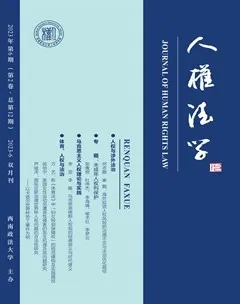A Study of the Legitimacy of FIFA
2023-04-29LUBinyang
LU Binyang
Abstract: This paper focuses on the legal dilemma faced by FIFA in dealing with human rights issues in Qatar. Firstly, FIFA's legal status is recognized as a domestic organization and, therefore, must follow domestic law when dealing with human rights issues. However, under the Swiss and Qatari legal systems, FIFA still needs to acquire a legal basis to engage in human rights matters. As far as Swiss law is concerned, this human rights matter is primarily concerned with human rights events in the host country and does not involve Swiss citizens or Swiss interests, which makes it difficult for Swiss law to support it. Qatari law likewise does not grant foreign organizations the power to participate in its human rights affairs.
Secondly, while FIFA can engage in human rights matters through the international human rights law system, international human rights law does not give it the power to sanction Qatar directly. FIFA can only participate in human rights matters by submitting communications to the United Nations, which does not give it substantive powers. FIFA still needs to be granted observer status under the United Nations system. By analyzing the international human rights conventions concluded by Switzerland and Qatar, this paper also emphasizes that FIFA's actions must be within the framework of legal sources. However, they do not empower it to participate directly in human rights matters. This paper also emphasizes that state sovereignty should take precedence over the protection of human rights and that FIFA has made a commitment to respect international law as a priority. Therefore, FIFA should respect the principle of national sovereignty first and foremost when it comes to human rights.
Again, this paper analyses the legal dilemmas faced by FIFA about human rights due diligence. Although the UN Guiding Principles on Business and Human Rights are the standard by which FIFA recognizes human rights abuses, they are not mandatory. FIFA can only bind itself through its commitments in its statutes, but not to third parties. The provisions of the Corporate Sustainability Due Diligence Directive also emphasize that the Directive does not give FIFA the power to impose enforcement measures and only requires that human rights impacts on partners are minimized. FIFA is active in human rights matters, but there is no corresponding legal authorization for its activities.
Finally, this paper explores FIFA's legal constraints in human rights issues at multiple levels, including international law, domestic law, international human rights conventions, and human rights due diligence requirements for multinational corporations. It summarizes FIFA's legal status in Qatar's human rights issues and its legal sources of participation in human rights governance. FIFA's role in human rights protection as an international organization suggests that international NGOs may become more actively involved in human rights governance in the future. However, such participation must still comply with basic international law norms and acquire a corresponding international law basis.
KEY WORDS: FIFA; international human rights law; human rights; enterprise due diligence
杂志排行
人权法学的其它文章
- 《人权法学》征稿启事
- On Governance Weakness and Legislative Path in Responding to Human Rights Risks of Overseas Investment
- 本刊介绍
- A Study on the Reasons and Problems of Sexual Abuses on American Female Athletes
- The Normative Construction and Implementation Path of "The Right to Special Guarantee for Women" in the New Law of the People
- The Classical Semantics and Contemporary Significance of Karl Marx
